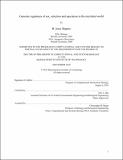Genomic signatures of sex, selection and speciation in the microbial world
Author(s)
Shapiro, B. Jesse (Benjamin Jesse)
DownloadFull printable version (13.26Mb)
Other Contributors
Massachusetts Institute of Technology. Computational and Systems Biology Program.
Advisor
Eric J. Alm.
Terms of use
Metadata
Show full item recordAbstract
Understanding the microbial world is key to understanding global biogeochemistry, human health and disease, yet this world is largely inaccessible. Microbial genomes, an increasingly accessible data source, provide an ideal entry point. The genome sequences of different microbes may be compared using the tools of population genetics to infer important genetic changes allowing them to diversify ecologically and adapt to distinct ecological niches. Yet the toolkit of population genetics was developed largely with sexual eukaryotes in mind. In this work, I assess and develop tools for inferring natural selection in microbial genomes. Many tools rely on population genetics theory, and thus require defining distinct populations, or species, of bacteria. Because sex (recombination) is not required for reproduction, some bacteria recombine only rarely, while others are extremely promiscuous, exchanging genes across great genetic distances. This behavior poses a challenge for defining microbial population boundaries. This thesis begins with a discussion of how recombination and positive selection interact to promote ecological adaptation. I then describe a general pipeline for quantifying the impacts of mutation, recombination and selection on microbial genomes, and apply it to two closely related, yet ecologically distinct populations of Vibrio splendidus, each with its own microhabitat preference. I introduce a new tool, STARRInIGHTS, for inferring homologous recombination events. By assessing rates of recombination within and between ecological populations, I conclude that ecological differentiation is driven by small number of habitat-specific alleles, while most loci are shared freely across habitats. The remainder of the thesis focuses on lineage-specific changes in natural selection among anciently diverged species of gamma proteobacteria. I develop two new metrics, selective signatures and slow:fast, for detecting deviations from the expected rate of evolution in 'core' proteins (present in single copy in most species). Because they rely on empirical distributions of evolutionary rates across species, these methods should become increasingly powerful as more and more microbial genomes are sampled. Overall, the methods described here significantly expand the repertoire of tools available for microbial population genomics, both for investigating the process of ecological differentiation at the finest of time scales, and over billions of years of microbial evolution.
Description
Thesis (Ph. D.)--Massachusetts Institute of Technology, Computational and Systems Biology Program, 2010. This electronic version was submitted by the student author. The certified thesis is available in the Institute Archives and Special Collections. Cataloged from student-submitted PDF version of thesis. Includes bibliographical references (p. 218-228).
Date issued
2010Department
Massachusetts Institute of Technology. Computational and Systems Biology ProgramPublisher
Massachusetts Institute of Technology
Keywords
Computational and Systems Biology Program.